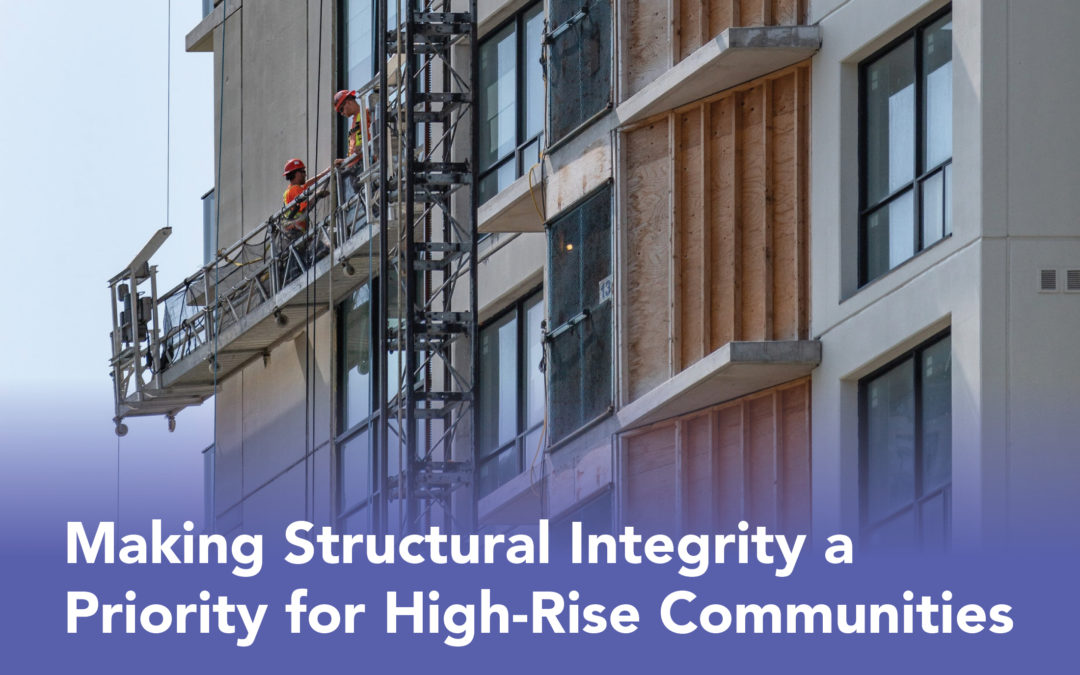Structural integrity in high-rise communities has been at the forefront of discussion after the tragic partial collapse of Champlain Tower South condominium in Surfside, Fla., in late June 2021. CAI’s recently released Condominium Safety Public Policy Report details public policy recommendations in this area that can provide solutions for legislators addressing high-rise building safety in their districts.
When an issue that impacts community associations arises, CAI develops public policy to guide volunteer advocates and staff in their efforts to find solutions. Public policies are created through a careful and ongoing process that reflects the interests of our more than 42,000 members, volunteers, and experts. The public policy positions are then reviewed by CAI chapters, state legislative action committees, member representation groups, and the College of Community Association Lawyers (CCAL), with final approval by the CAI Board of Trustees.
More than 600 people participated in CAI’s three-month process to identify recommendations, including community association leaders, experts in numerous disciplines and technical areas, and key stakeholders from different organizations. CAI believes these recommendations should be considered for adoption into state law to support the existing statutory framework for the development, governance, and management of community associations.
Building Maintenance and Structural Integrity
Nearly half of those surveyed in the Foundation for Community Association Research’s Breaking Point: Examining Aging Infrastructure in Community Associations report considered deteriorating infrastructure as a top-ranked concern, while 70% indicated that maintaining property values was of primary importance. CAI supports policy that requires initial and recurring inspections for buildings and other major structural elements owned or maintained by the association. This includes all multifamily buildings and structures made of concrete, load-bearing masonry, steel, or structural systems such as heavy timber, including podium decks.
CAI recommends additional requirements by developers during the development process and prior to transition to the homeowners. CAI worked closely with developers on these recommendations. Structural integrity is addressed through statutorily mandated building inspections starting when the building is 10 years old, another inspection at 20 years, and every five years thereafter. Inspections are based on the American Society of Civil Engineers’ (ASCE) published protocol for building inspections (ANSI).
Local building inspectors play a key role in the execution of structural integrity public policy. Those with the authority to provide a certificate of occupancy and otherwise condemn a building have the authority and obligation to inspect a building’s structural integrity. CAI supports legislation that requires inspections be conducted by a qualified individual holding at least one of the following titles:
- Licensed engineer with appropriate qualifications
- Local municipal building inspector if he or she is a licensed professional engineer in good standing
- Licensed engineer hired by the building inspector, the community association, or the building owner
CAI supports legislation that requires inspectors to notify local government authorities in writing (with record of the date and receipt of notice) if a safety concern is identified in the inspection report.
CAI also supports laws that provide community association boards the power to impose a special assessment or borrow funds necessary to make immediate repairs without a vote of the homeowners, regardless of the provisions in the governing documents. These policy recommendations support community association boards and urge them to follow the advice of professionals and best practices, especially in circumstances that are related to life, health, and safety.
Read CAI’s entire public policy on building inspections and structural integrity and find more resources to protect your community at www.caionline.org/CondoSafety, including the full Condominium Safety Public Policy Report available for download.
>> Follow legislation related to building inspections on CAI’s Legislative Tracking map




This idea can only lead to breach of fiduciary duty lawsuits. It has no conflict-of-interest provisions. It has not lender requirements. i.e. state registered or federally registered banks and not cousin Vinney.
https://condohoaloans.com/